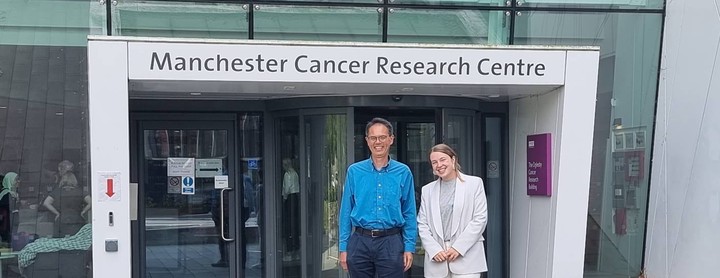Visiting the Wedge Group - Summer 2023

On Saturday, April 1st, it was the day of my journey from The Netherlands to Manchester, where I would be exploring this vibrant city for the next four months. The journey was not just an adventure but a part of my four-year PhD trajectory at the Leiden University Medical Center in Leiden, The Netherlands. It marked the beginning of a fruitful collaboration between our institutions and the University of Oxford, led by Dr. Tjalling Bosse, Prof. David Wedge and Dr. David Church, respectively.
With a background in both Medicine and Biomedical Sciences, I was excited to step into the realm of bioinformatics in a more technically oriented research group. During my internship, I had the opportunity to participate in fascinating meetings, presentations, and engaging discussions with fellow group members. What struck me the most during this experience was the shift in my perspective. I realized that, by nature, I tend to approach problems from a biological standpoint. However, being part of this group taught me to broaden my horizons and delve into the overarching technical concepts that underpin our work.
Our collaborative project focuses on endometrial carcinoma, a type of cancer affecting the womb. In 2013, a ground-breaking study from The Cancer Genome Atlas (TCGA) redefined our understanding of this disease (Levine et al. 2013, Nature). Instead of viewing it as a single entity, four distinct subtypes have been identified, each with unique prognostic and predictive characteristics. The most aggressive of these subgroups is ‘p53-abnormal EC’, initiated by TP53 mutations that drive abundant copy number alterations. Within this subgroup, we observe extensive heterogeneity in CN alterations. Therefore, we aimed to (1) characterise the evolution of CN-alterations and (2) assess how the evolution affects the chromosomal inability phenotype by assessing CN signatures (Drews et al. 2022, Nature).
Importantly, p53-abnormal EC is quite a rare subgroup. In this project, we therefore joined forces and combined data from the EC biobank in The Netherlands with those from Genomic England, resulting in a substantial cohort of over 750 p53-abnormal EC cases. The input and more technical perspective from the group of Prof. David Wedge gave an extra dimension to this project. Overall, this extensive dataset enables a comprehensive and in-depth characterisation of this rare and aggressive EC subtype. The analyses of the study are currently ongoing, and will likely result in multiple conference abstracts and publications in the beginning of next year. I am extremely grateful for the opportunity to be part of a highly dynamic and engaging research group with very pleasant and helpful colleagues with diverse scientific backgrounds. Finally, I would like to use this opportunity to thank David Wedge, Aliah Hawari, and the entire Wedge group for the truly inspiring experience.